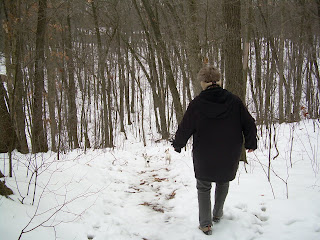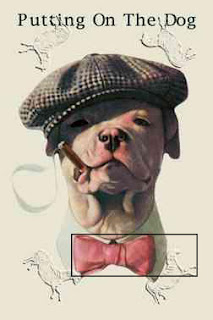"Fireweed Moon," by Ron Birdsall, 1988
Framing Blueberry Lake, Alaska
By Zinta Aistars
The full moon in Alaska mesmerizes as nowhere else. It hangs low in the sky, nearly close enough to touch, a great creamy other world presence that makes the blood rise. It was enough to make a woman throw her head back and howl.
I did not howl. Not, at least, so that he could hear me. I stepped outside our 27-foot RV into the chill arctic night and stood gazing at the white mountains, bathed in blue moonlight. My blue tin coffee cup steamed in my hands. Inside the RV, my two small children slept, and he slept, perhaps, or perhaps not. That did not concern me. Only this moon did, and the rising howl deep inside.
It was approaching winter 1989, and we—my daughter, my son, and my husband—had been on the road for nearly nine months. We had no plans of returning to our home in Kentucky anytime soon. There was a beautiful house back there, some fifteen minutes south of the Ohio border and Cincinnati. Our furniture business, built from the ground up and in its dizzingly successful eighth year, awaited us there.
Let it all wait.
I was in no hurry to return. I could stand here, gazing at these white jagged mountains against the midnight blue of the northern sky, baring my heart to the moon, forever. A woman of two countries and dual citizenship, I had never been able to call anyplace truly home, but this wild and stunningly beautiful land called to me as no other had before or since.
I would have hoped he would understand. His roots were in two countries, too. One of our first bonds was that we shared an ethnic background, even as in most other ways we were a classic case of opposites attract. I was born in Chicago but raised in a small town in Michigan; he was born in Brooklyn and raised in Queens, a New York City man to the bone. I was an English major in college, with an emphasis on creative writing and literature. He was an economics major from Queens College, and for him, life could always be reduced to numbers and business trends. He was enchanted by my passion for art, but saw no practical business sense in it. And what else mattered?
We were partners in life, in parenthood, in business. Our retail store in Cincinnati was thriving. He did the books and I did the marketing and PR. We both did sales, and with his love for competition, he was always betting me on which of us could outsell the other. To his constant surprise and niggling frustration, I nearly always won the bet. I was an artist with a good sense for what sells and how. I was able to fully enter into his world, and to my own surprise, I loved that world, too. But he could not enter mine.
We had a dozen years together behind us. Nearly all of them were good, even very good. He was a good man. And I never minded his long hours at the business; I understood that kind of passion, and expected it. I was deep into my own. Writing, writing, writing every day, a novel taking shape that had me on constant adrenalin. It was our other bond—he had captured my interest and eventually my heart with his life motto, “Where there’s a will, there’s a way.” And so there was.
What to do, then, when two wills forked in the road to go their separate ways?
My blue tin cup held tightly in my mittened hands, I gazed up at the moon in wonder. This fork in the road, the one I sensed at Blueberry Lake, near Valdez, was one I knew was mine to navigate. I had, in fact, made my decision some weeks before, when we had driven north, past the Arctic Circle, as far as the road went and then stopped, with no more road to take. We were in the Alaskan tundra, a great expanse of mossy ground and rising boulders, frozen soil covered by lichen and tiny ground blueberries. More than two decades later, I can still say: there is no more beautiful place on the earth. Not to my eyes. Not to my heart.
I felt myself at home and did not want to leave, ever. He thought me mad, and declared that we would go. Take me in body, then, I said, but my spirit remains here.
I looked out on the vast wilderness that day as I looked out on the vast wilderness that night on Blueberry Lake. It was the last decision he would ever make for me again. I knew a sense of calm, as one knows when the next decision to make is right. On our return to Kentucky, whenever that might be, weeks or months or even a year from that moment, as our travels had no designated end, I would declare my independence. I would take life on my own, with my children. It was being on the road together that decided me. Living together, we had been comfortable each immersed in our own lives. Each pursuing our own dreams. But it was on this journey, being together 24 hours a day, seven days a week, that I understood he would never share my dream, even if I could happily share his. It was on this journey that I understood, opposites may on occasion attract, but they do not make sound and long-lasting relationships. He had begun to ridicule my dreams, call them foolish, insist I abandon what was obviously not going to be a money-making business plan. And, as his anger rose to a reddening pitch at my refusal to put down the pen, I took note that the glass in his hand kept rising to his mouth, and it never emptied.
That moon. On January 30, 2010, there is a full moon out again. This is the year that has begun with a full and blue moon. With my house renovation turning my house into my perhaps first real Home, my eyes took renewed focus on the painting taped to my bedroom wall. It is a painting of Blueberry Lake in Alaska, by Ron Birdsall. When I came across it in an art gallery in Juneau, Alaska, I had to have it. It would remind me always of a telling moment in the mountains one northern night, when I knew a sense of bliss rising within me at the first step toward a life I could at long last truly call my own. It was a joy in being alive. Even as I could not know what I would encounter when I packed a few bags, took each small child by the hand, and left that Kentucky house and business and life behind two months after our return. I was about to enter into a life that would seem like never-ending turmoil. It would be a life of struggle, of many, many moves, of travels across this country and over the ocean. It would be a life of finding a great love and the heartbreaking decision I would have to make years later at yet another fork in the road. It would be a life of knowing poverty, of being the victim of crime, of encountering betrayal and abuse and those who live life with two faces, wrapped in lies. It would be a life of discovery of place, person, and most of all, self.
It would be a life of learning how to make a living as a writer. Pursuing my art, even while using my creative tools in business to make a good living and a fine life.
It would be a life that would at long last settle into a quieter place. So quiet, indeed, at times, that no one might suspect the ravaged and pitted road behind me. That is as it should be. As I now want it to be. For all its tests, I would not trade the life I have had for any other. Not for any price. I took the right fork in that road, and I stand under a full moon tonight and raise that very same blue tin cup toward it.
And the Birdsall painting of Blueberry Lake… it struck me that after 21 years, it was time to put a proper frame around it. I could afford to do that now. When I picked up the newly framed painting at the frame shop this week, I stared at it again, as if for the first time, as if I were standing there again, in the fresh chill of a northern night, silently declaring myself free. These many years later, a different woman yet ever the same, I stand in the moonlight again, and throw my head back to expose a white throat to the moon, and howl.
For the sheer, wild joy of it, and in a nod of respect to that young woman standing in the cold, blue moonlight so long ago.






















